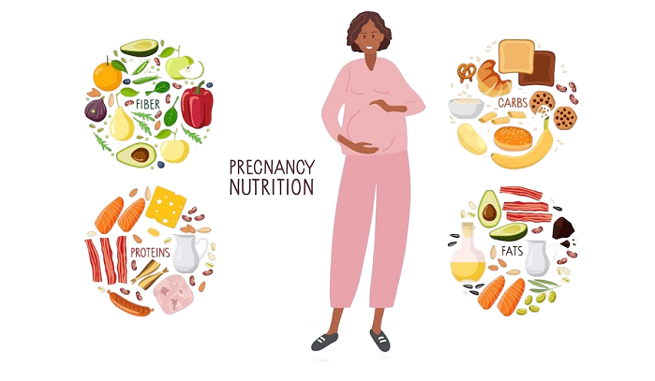
A mother is a source of nutrition for the embryo. A nutrient-rich diet fosters a baby’s brain development and healthy birth weight. A healthy diet prevents the baby from birth defects as well as wards off unpleasant symptoms such as morning sickness and anemia.
Being malnourished or having overweight can hamper the health of the mother and baby. It will also give rise to chronic diseases in upcoming babies such as hypertension, heart attack, strokes, metabolic disorders, type 2 diabetes, psychiatric disorders, etc. Therefore, having the right balance of nutrition is crucial during pregnancy. let's discuss what are the important nutrients during pregnancy.
Essential nutrients during pregnancy
Prenatal vitamins: Supplements are important to fill the gaps in nutrition requirements that are not totally fulfilled by diet alone.
Prenatal vitamins play important role in pregnancy by satisfying the body's increased demand for micronutrients. Prenatal vitamins should be taken prior to conception, after pregnancy, and during breastfeeding. Some of the prenatal vitamins are as follows:
1. Folic acid or folate is beneficial for growth and development, red blood cell production, and DNA synthesis. 600 mcg folic acid per day can decrease the risk of congenital heart defects, and neural tube defects such as spina bifida, cleft lip, and cleft palate. Cereals, leafy green vegetables like spinach, citrus fruits, beans, and green peas are good sources of folic acid.
2. Iron is also required for growth and development as well as oxygen transport. Iron deficiency anemia is common in pregnant women which leads to preterm birth, anemia of infants,s and mental depression. Required iron intake is 27 mcg par day.
Eggs, fish, kidney beans, chickpeas, black-eyed beans, ragi, vegetables like broccoli, spring greens, soya beans, and dry fruits can add iron in your diet. Citrus fruits help in the absorption of iron whereas drinking tea and coffee will reduce the absorption of Iron, especially when consumed with meals.
3. Vitamin D deficiency can lead to risk of preeclampsia, C-section delivery, gestational diabetes, and preterm birth. The recommended dose of Vitamin D is 15 mcg per day.
Our skin can absorb abundant of vitamin D from sunlight. Every day a walk-in the morning can be beneficial for you and your baby. After birth also doctors’ advice exposing your baby to mild sunlight for amazing benefits.
4. Calcium is required for bone and teeth growth of baby as well as it keep blood and muscles moving. 1000 mg of calcium is required every day during pregnancy. If this requirement is not fulfilled by diet, then gynaecologist will add calcium supplements. Milk and milk products like paneer, cheese, curd and vegetables like broccoli, seafood is rich in calcium.
5. Vitamin B12: It is essential for formation of red blood cells and nervous system. Due to deficiency of vitamin B12, neural tube defects are developed in embryo. During pregnancy 2.6 micrograms of B12 is required. Animal products such poultry, milk, fish, meat, liver can provide B12.
6. DHA supplement: it is recommended to take 200 mg of DHA per day. It is an essential Omega 3 fatty supplement which is required for brain growth. DHA play important role in optimal visual and cognitive development in children. It is also associated with better-quality sleep-in infants.
The supplement requirements are subjective, please consult your doctor before use.
Protein: Proteins act as building blocks in the development and growth of baby. Protein help to acquire healthy body weight in new-born baby. Eggs, poultry, lean meats, paneer, and curd are good sources of protein.
Protein shakes and protein powders are not considered safe during pregnancy. Please seek advice before use from your gynaecologist.
Antioxidants: Add a lot of colours to your plate with variety of fruit and vegetables. Fruit and vegetable provide antioxidants which will fight infections and boost your immunity.
Water: Drink at least 8 to 10 glasses of water every day. To keep yourself hydrated you can add fluids in different forms like fresh fruit juices, coconut water, smoothies, soups etc. Water intake will ensure internal system running smoothly. It will improve bowel bladder movement and prevent constipation.
Appropriate nutrition intake can help to maintain acceptable birth weight in newborn, infant free of congenital defects, long term health benefits for mother and infant.
Foods that are not recommended during pregnancy:
· Unpasteurised milk
· Raw and red meat
· Raw eggs
· Fish with high mercury content
· Raw fish
· Limit caffeine upto 200mg/day
· Drinks containing artificial sweeteners
To know more about nutrients in pregnancy, consult our expert.
Dr. Saloni Aggarwal:
MBBS, MD Obstetrics & Gynaecology